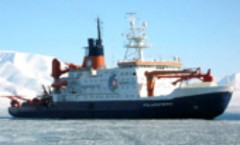BGIA - Archive 2003: Does air conditioning on vessels make people sick?
Investigations on hygienic quality in air-conditioning systems on sea vessels by See-BG and BIA

Research vessel Polarstern, Source: IFA
(bgi) - In a common research project, the See-BG (the institution for statutory accident insurance and prevention in the maritime industries), Hamburg and the BG institute for occupational safety and health - BIA - in Sankt Augustin, Germany analyse the hygienic state of air-conditioning systems (AC) on sea vessels. The cooperation between microbiologists and occupational physicians exists since the beginning of 2001, due to the observation of the occupational physicians of the See-BG that nearly the moiety of the seamen will come down with diseases of the upper respiratory tract. Therefore, a potential relationship between the concentration of microbial volatile organic compounds (MVOC) in workplaces on vessels and their distribution by ACs should be determined. In addition, the impact of the outside climate on the quality of the indoor air will be studied under different climatic conditions (from middle to tropical regions).
This project is exceptional for the BIA microbiologists because of assembling mobile laboratory equipment. Most of the microbial probes have to be analysed within 24 hours after sampling. Consequently, investigations are done on-site.
After sampling in middle and tropical regions, the study was now carried out on the research vessel Polarstern. "This vessel was most advantageous," says Dr. Annette Kolk, head of the BIA department for microbiology. As the Polarstern is in global assignment, the indoor air has to be humidified. Especially the humidifying water provides optimal growth conditions for bacteria. During the three-week expedition on the Polarstern, Dr. Annette Kolk and Dr. Irene Brauer, head of the occupational toxicology at the See-BG, were looking for concentrations of bacteria and mould spores in the indoor air. Water was also tested for the occurrence of microorganisms or, particularly, legionella. The two scientists processed air and water samples on-site. Solid samples were stored and analysed at the microbial laboratory of the BIA. That applies to the identification of microorganisms, too: on-site, pure cultures were isolated, cooled and stored for further analyses.
Based on the studies on a ferry, on two container vessels, and on the research vessel Polarstern, a definite statement is not possible. Thus, the project will be continued.
Contact
Chemical and biological hazards
Tel: +49 30 13001 3240Fax: +49 30 13001 38001